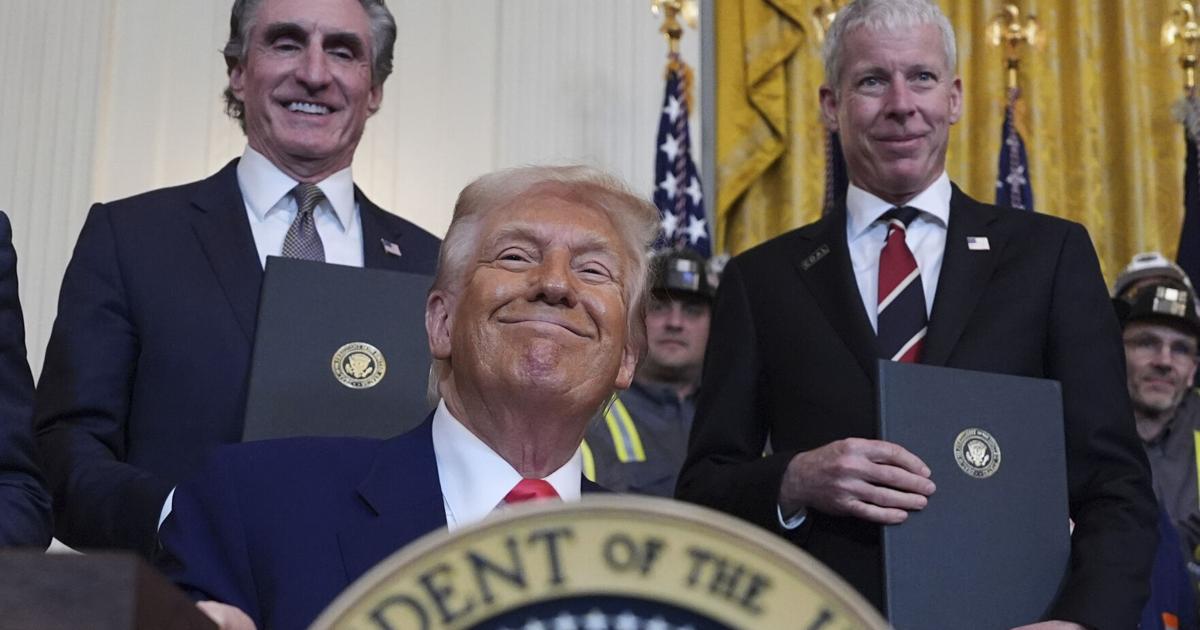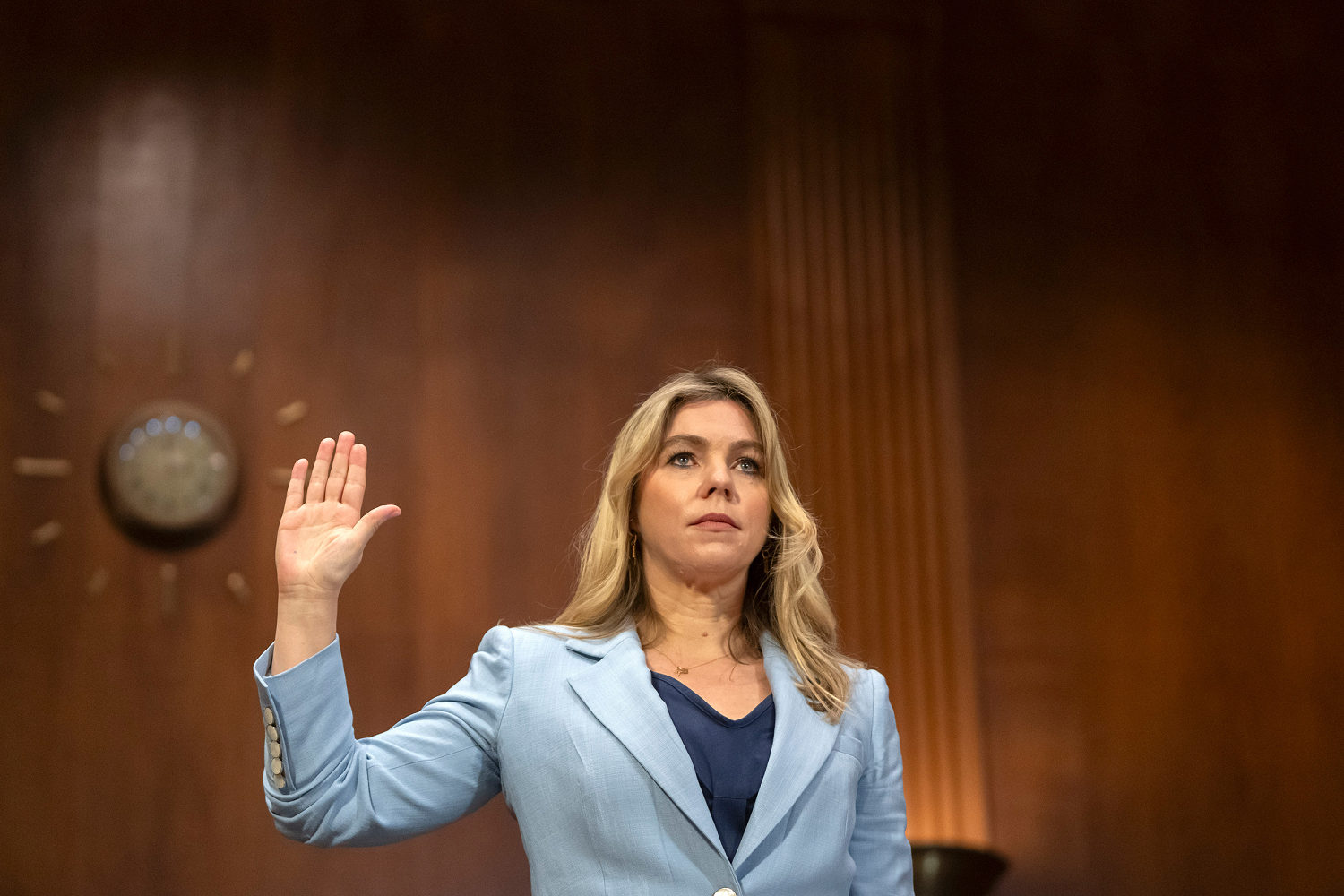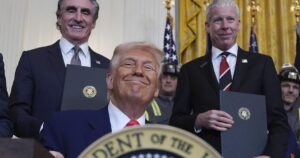The Dictatorship
Trump fires at least 3 national security aides after meeting with far-right activist

Less than 24 hours after an Oval Office meeting with Laura Loomer, during which the far-right activist and conspiracy theorist pressed for “vetting” of the administration’s national security team, Donald Trump has fired at least three National Security Council officials, three people familiar with the matter told NBC News.
Brian Walsh, a director for intelligence on the NSC, was let go, the sources told NBC News, as well as two other senior officials: Thomas Boodry, a legislative director for national security adviser Michael Waltz when he was in Congress, and David Feith, who worked for the State Department during Trump’s first term.
In a statement to NBC News, Loomer confirmed Wednesday’s meeting, calling it “an honor” to present Trump with her “findings.”
“Out of respect for President Trump and the privacy of the Oval Office, I’m going to decline on divulging any details about my Oval Office meeting with President Trump,” the statement read. “I will continue working hard to support his agenda, and I will continue reiterating the importance of strong vetting, for the sake of protecting the President and our national security.”
Loomer confirmed Wednesday’s meeting, calling it ‘an honor’ to present Trump with her ‘findings.’
Waltz and Vice President JD Vance were also present at Wednesday’s meeting, two sources familiar with the event told NBC News. During that meeting, Waltz reportedly defended the members of his staff after Loomer pressed Trump to fire them, one of the people familiar with the meeting told NBC News. It’s not clear if Loomer targeted Walsh, Boodry and Feith during the meeting.
Trump’s national security team has been thrust into the spotlight after journalist Jeffrey Goldberg of The Atlantic reported that Waltz added him to a high-level group chat on Signal about U.S. military strikes in Yemen. In the wake of that scandal, some have called for Waltz’s resignation.
National Security Council spokesman Brian Hughes declined to comment.
The far-right social media influencer has targeted NSC staff publiclyaccusing them of not being sufficiently loyal to the president. She has also taken aim at other Trump administration officials, including Attorney General Pam Bondi. In February, she was one of many on the right to express anger over the Justice Department’s rollout of documents related to the Jeffrey Epstein case, which provided little if any new information. “I hate to say it, but the American people can’t trust the validity of the Epstein files released today,” Loomer wrote on X. She also called Bondi a “total liar” and said the attorney general should resign.
Loomer’s close relationship with the president came under fire from both Democrats and Republicans in the closing months of his 2024 campaign. Loomer has described herself as a “Proud Islamophobe” and, in 2017, she said she’s “pro-white nationalism.” She also pushed false conspiracy theories about the 9/11 terrorist attacks, alleging they were “an inside job.” Loomer’s remarks have been called “extremely racist” by another close Trump ally and conspiracy theoristRep. Marjorie Taylor Greene of Georgia, who called out comments Loomer made about then-Vice President Kamala Harris.
Although Trump aides and advisers reportedly tried to put distance between him and Loomer, they failed. In September, she traveled with Trump on his private plane to his debate against Harris in Atlanta and to 9/11 memorial services in New York the following day.
“No one can keep former President Donald Trump away from Laura Loomer,” NBC News reported at the time.
The Dictatorship
The Latest: Treasury secretary says Trump will keep 10% import tariff, raise import tax on China

Judge directs administration to take all available steps for return of mistakenly deported man
Q&A: What has China done so far? What could China do next?
Tennessee receivers will need to step up to put the air back in Heupel’s offense
Race for Champions League places promises an intense finish in France
Fatou, the world’s oldest gorilla in a zoo, is celebrating her 68th birthday in Berlin
Mideast mediator Oman at the center of a key first Iran-US meeting over Tehran’s nuclear program
Sheriff: Walmart employee kills co-worker in Georgia store, woman at nearby home, wounds 3rd person
Italy sends rejected migrants to detention centers in Albania
By the numbers: Why the ‘Egyptian King’ reigns at Liverpool
JPMorgan logs Q1 profit of $14.6 billion as CEO warns of uncertainty over global trade, other events
France rugby star Chabal does not remember ‘a single second’ of his career due to concussion
Here’s what some exporters in China say about Trump’s trade war
India among 7 possible bids to host 2031 Asian Cup in men’s soccer. China is not among them
An AP photographer uses the clouds to give his shot depth and clarity
UK economy enjoyed unexpected growth spurt in February before Trump tariff turmoil
Jailed Istanbul mayor appears in court as supporters gather outside his prison
Israel’s army says it will fire air force reservists who condemned the war
Leo Beenhakker, Dutch soccer great who coached Real Madrid and two World Cup teams, dies at 82
Meeting on shipping emissions could result in the world’s first global carbon tax
Norris warns of challenging F1 track for McLaren at Bahrain Grand Prix
Ousted South Korean President Yoon embraces supporters after leaving presidential residence
Winning numbers drawn in Thursday’s Mississippi Cash Pop
China hits back at US and will raise tariffs on American goods from 84% to 125%
Detroit tries to break road losing streak, takes on Tampa Bay
Nashville visits Vegas after shootout win
Stars take on the Utah Hockey Club on losing streak
Washington visits Columbus after shootout victory
Philadelphia hosts New York after Foerster’s hat trick
Kings host the Avalanche after Fiala’s 2-goal game
Blackhawks host the Jets following Foligno’s 2-goal game
The Dictatorship
Supreme Court says Trump officials must ‘facilitate’ release of wrongly deported man

The Supreme Court said Thursday that the Trump administration must “facilitate” the release of a man the government admitted it wrongly deported to El Salvador, sending the case back to the judge who ordered his return for further clarification of her order and leaving the ultimate fate of the case unclear.
After the Trump administration admitted that it had wrongly deported Kilmar Abrego Garcia to El Salvador, a federal judge in Maryland had ordered the government to “facilitate and effectuate” his return by 11:59 p.m. Monday, April 7. A federal appellate panel declined the administration’s request to halt the judge’s order, but Chief Justice John Roberts temporarily granted the request on the afternoon of that midnight deadline, pending further word from him or the full high court.
That word came Thursday with an order that said the judge had properly required the government to “facilitate” Abrego Garcia’s release from custody in El Salvador and to ensure that his case is handled as it would have been had he not been improperly sent to El Salvador. But the order also said that the “intended scope of the term ‘effectuate’ in the District Court’s order is, however, unclear, and may exceed the District Court’s authority,” adding: “The District Court should clarify its directive, with due regard for the deference owed to the Executive Branch in the conduct of foreign affairs. For its part, the Government should be prepared to share what it can concerning the steps it has taken and the prospect of further steps.”
In statement accompanying Thursday’s order, the court’s three Democratic appointees said they would’ve declined to intervene in this litigation and effectively held the government to the judge’s directive.
“Nevertheless, I agree with the Court’s order that the proper remedy is to provide Abrego Garcia with all the process to which he would have been entitled had he not been unlawfully removed to El Salvador,” Justice Sonia Sotomayor wrote, joined by Justices Elena Kagan and Ketanji Brown Jackson. “That means the Government must comply with its obligation to provide Abrego Garcia with ‘due process of law,’ including notice and an opportunity to be heard, in any future proceedings.”
“In the proceedings on remand, the District Court should continue to ensure that the Government lives up to its obligations to follow the law,” Sotomayor added, with “remand” referring to the process of a case being sent back to a lower court.
The justices are assigned to field emergency litigation from different geographical regions across the country, and this one from the Richmond, Virginia-based 4th U.S. Circuit Court of Appeals went to Roberts. When justices receive such emergency applications, they can rule themselves or refer matters to the full court for decision. Significant matters are typically decided by the full court, though the relatively short timeline on the day he issued the temporary relief could have motivated Roberts to act alone.
The court was also busy with another case that day, which became apparent later on Monday when the high court split 5-4 in a separate appeal to grant the Trump administration emergency relief in its use of the Alien Enemies Act to conduct deportations. Dissenting in that caseSotomayor cited Abrego Garcia’s then-pending case to warn about the dangerous nature of the government’s position that it doesn’t have to return erroneously deported people. “The Government’s resistance to facilitating the return of individuals erroneously removed to CECOT [El Salvador’s Center for Terrorism Confinement] only amplifies the specter that, even if this Court someday declares the President’s [Alien Enemies Act] Proclamation unlawful, scores of individual lives may be irretrievably lost,” Sotomayor wrote.
Notably, the Supreme Court majority said in that case that people facing deportation under the Alien Enemies Act are still entitled to due process. In a filing to the justices on Tuesday, Abrego Garcia’s lawyers cited Monday’s Alien Enemies Act ruling in writing that, while his case doesn’t involve that act, the court’s due process protection in that case “supports Abrego Garcia’s position that the Government violated his due process rights by removing him to El Salvador.” They wrote that the justices’ unanimous insistence on due process “underscores that Abrego Garcia — who was removed without reasonable notice or an opportunity to challenge his removal before it occurred, and in conceded violation of a court order prohibiting his removal to that country — must have a remedy for this constitutional violation.”
In its Supreme Court application to halt U.S. District Judge Paula Xinis’ order ahead of her deadline in Abrego Garcia’s case, the government conceded making an “administrative error” in sending him to El Salvador. But it said that still doesn’t give district judges license “to seize control over foreign relations, treat the Executive Branch as a subordinate diplomat, and demand that the United States let a member of a foreign terrorist organization into America tonight.”
In the application, filed before the justices ruled in the Alien Enemies Act case, U.S. Solicitor General John Sauer said the order from Xinis, an Obama appointee, was “unprecedented” in “dictating to the United States that it must not only negotiate with a foreign country to return an enemy alien on foreign soil, but also succeed by 11:59 p.m. tonight.”
Justifying her orderXinis wrote thatthe government acknowledged it “had no legal authority to arrest him, no justification to detain him, and no grounds to send him to El Salvador — let alone deliver him into one of the most dangerous prisons in the Western Hemisphere.” As to the government’s claim that he’s an MS-13 gang member, the Maryland judge wrote: “The ‘evidence’ against Abrego Garcia consisted of nothing more than his Chicago Bulls hat and hoodie, and a vague, uncorroborated allegation from a confidential informant claiming he belonged to MS-13’s ‘Western’ clique in New York — a place he has never lived.”
Opposing the government’s high court application, Abrego Garcia’s lawyers wrote that their client “has never been charged with a crime, in any country. He is not wanted by the Government of El Salvador. He sits in a foreign prison solely at the behest of the United States, as the product of a Kafka-esque mistake.”
Before winning temporary relief from Roberts, the administration failed to get the 4th Circuit to halt Xinis’ order. In separate opinionsexplaining their views, the appellate judges wrote that the government “has no legal authority to snatch a person who is lawfully present in the United States off the street and remove him from the country without due process,” that the government’s contrary arguments are “unconscionable” and that there’s “no question that the government screwed up here.”
Subscribe to theDeadline: Legal Newsletterfor expert analysis on the top legal stories of the week, including updates from the Supreme Court and developments in the Trump administration’s legal cases.
Jordan Rubin is the Deadline: Legal Blog writer. He was a prosecutor for the New York County District Attorney’s Office in Manhattan and is the author of “Bizarro,” a book about the secret war on synthetic drugs. Before he joined BLN, he was a legal reporter for Bloomberg Law.
The Dictatorship
Rare show of Senate bipartisanship breaks out over mistrust of Mark Zuckerberg

At a time when bipartisan agreement is scarce in Washington, D.C., senators from both parties seemed to unite Wednesday at a Senate Judiciary subcommittee hearingwhich centered on bombshell allegations from a Meta whistleblower. All seemed to agree that Meta poses a threat to free and civil discourse, and that the company’s CEO, Mark Zuckerberg, is not to be trusted.
The hearing was a public opportunity for Meta executive Sarah Wynn-Williams to air allegations made in her recent book, “Careless People,” which details her time working alongside Meta bigwigs like Zuckerberg, Chief Global Affairs Officer Joel Kaplan and former Chief Operating Officer Sheryl Sandberg. Meta fought hard in court to prevent Wynn-Williams from promoting her book and, according to Wynn-Williamseven sought to prevent her from speaking with members of Congress.
Among the more eye-popping allegations in her testimony:
- That Meta, as part of its pitch to expand Facebook into China, developed censorship technology that could be used by its government.
- That Meta censored a Chinese dissident at Chinese officials’ behest.
- That Meta has deceived the U.S. Congress about its ongoing operations in China.
Meta spokesperson Andy Stone said in a statement that Wynn-Williams’ testimony is “divorced from reality” and that “while Mark Zuckerberg himself was public about our interest in offering our services in China and details were widely reported beginning over a decade ago, the fact is this: We do not operate our services in China today.”
Here are some other key takeaways from Wednesday’s hearing.
Mistrust of Zuckerberg
Mistrust of Zuckerberg was remarkably bipartisan. These quotes from Sens. Josh Hawley, R-Mo., and Richard Blumenthal, D-Conn., exemplify what I mean.
Hawley:
Sarah Wynn-Williams knows the truth about Facebook — that’s what they fear. She knows that while Mark Zuckerberg now claims to be a champion of the United States and claims to be a free speech warrior, he in fact worked hand in glove with the Chinese Communist Party for years. He in fact made censorship his business model. He in fact developed censorship tools for the Chinese Communist Party to use against its own people. He in fact made Americans’ own user data available, was willing to make it available, to Beijing.
Blumenthal didn’t sound impressed with Zuckerberg’s public image as a “free speech champion” either, and he suggested the CEO’s recent pivot to MAGA might be an effort to defuse a Federal Trade Commission lawsuit against Meta over alleged antitrust infractions.
Blumenthal said at the hearing:
It is disgusting and the height of hypocrisy for a supposed free speech champion, Mark Zuckerberg, and Meta to use a campaign of threats and intimidation to try to silence you. But it is part of a pattern. Meta is trying to buy and even bribe and pander its way out of any accountability. It has donated a million dollars to Trump’s inaugural fund. It started ripping up its policies on hate speech and letting fraud and abuse run rampant on its platforms. And, appallingly, according to The Wall Street Journal, Zuckerberg has recently visited the White House, three times, to get the president to order the Federal Trade Commission to drop its antitrust case. Meta will stop at nothing to dispel and disguise and deceive.
There was no love lost, on either side of the aisle, for Zuck.
Watch Wynn-Williams’ exchange with Hawley here:
Censorship of Bannon ally Guo Wengui
Wynn-Williams testified that Meta censored a Chinese dissident at the request of Chinese officials, and that the dissident was Guo Wengui, a federally convicted fraudster and MAGA-friendly ally of far-right activist Steve Bannon. Wynn-Williams said Facebook’s claim that a 2017 suspension of Guo’s account stemmed from a temporary glitch was a lie, and that the decision to temporarily kick him off the platform actually came as a result of pressure from a Chinese official.
Stone, the Meta spokesperson, said in a statement that Guo “faced account restrictions because he shared personally identifiable information such as passport numbers, social security numbers and addresses,” The Washington Post reported.
Pressure on Meta from all sides
There’s more scrutiny of Meta on the horizon. Wynn-Williams told the panel that Meta’s claim that it is not operating in China is a lie; she claimed Meta showed a willingness to compromise Americans’ data in exchange for a foothold in China; and she’s filed complaints with the Securities and Exchange Commission and the Justice Department to investigate. She also alleged that Meta has had a multibillion-dollar business relationship with China for more than a decade and claimed Facebook’s artificial intelligence models were used to build DeepSeek, a powerful Chinese AI company.
Blumenthal and Hawley have opened a joint probe into Meta’s alleged operations in China.
All of this is happening as Meta prepares for the FTC case that may force it to spin off some of its brands, like WhatsApp and Instagramto avoid running afoul of anti-monopoly rules.
-

 The Josh Fourrier Show5 months ago
The Josh Fourrier Show5 months agoDOOMSDAY: Trump won, now what?
-
Uncategorized5 months ago
Bob Good to step down as Freedom Caucus chair this week
-
Uncategorized5 months ago
Johnson plans to bring House GOP short-term spending measure to House floor Wednesday
-

 Politics5 months ago
Politics5 months agoWhat 7 political experts will be watching at Tuesday’s debate
-
Economy5 months ago
Fed moves to protect weakening job market with bold rate cut
-
Economy5 months ago
It’s still the economy: What TV ads tell us about each campaign’s closing message
-

 Politics5 months ago
Politics5 months agoRFK Jr.’s bid to take himself off swing state ballots may scramble mail-in voting
-

 Politics5 months ago
Politics5 months agoHow Republicans could foil Harris’ Supreme Court plans if she’s elected







